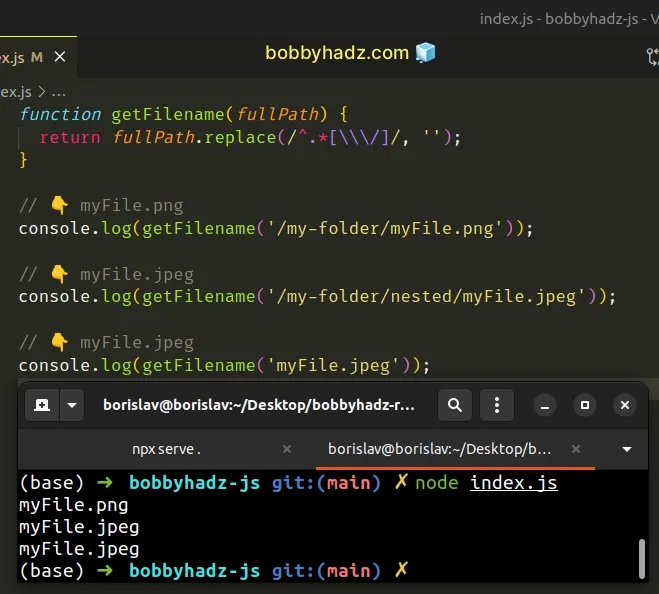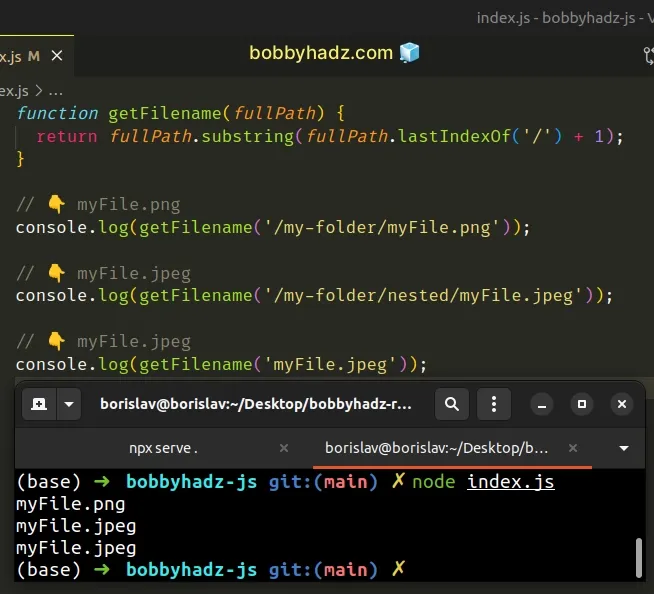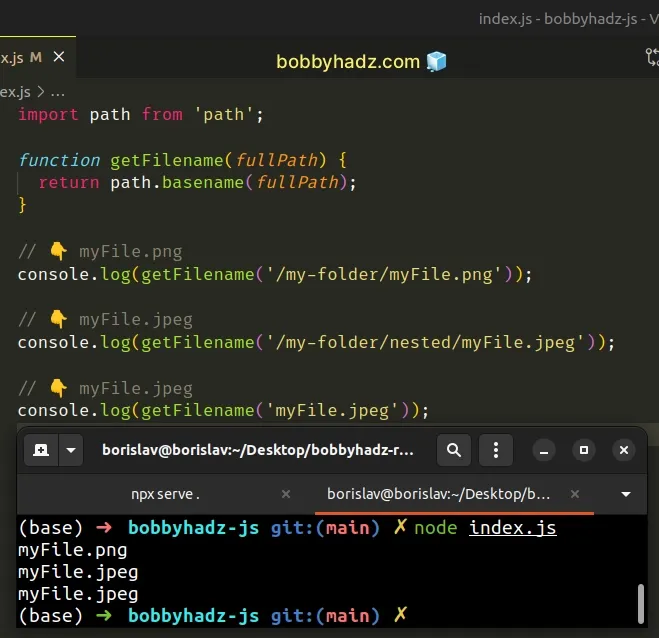Get the filename without the path using JavaScript
Last updated: Mar 6, 2024
Reading time·3 min

# Table of Contents
- Get the filename without the path using JavaScript
- Get the filename without the path using substring()
- Get the filename without the path using path()
# Get the filename without the path using JavaScript
To get a filename without the path, call the replace() method with the
following regular expression: /^.*[\\\/]/ as the first parameter and an empty
string as the second.
The method will return a string that only contains the filename.
function getFilename(fullPath) { return fullPath.replace(/^.*[\\\/]/, ''); } // 👇️ myFile.png console.log(getFilename('/my-folder/myFile.png')); // 👇️ myFile.jpeg console.log(getFilename('/my-folder/nested/myFile.jpeg')); // 👇️ myFile.jpeg console.log(getFilename('myFile.jpeg'));

We created a reusable function that takes a full path and returns the file name.
We passed the following 2 parameters to the String.replace() method:
- A regular expression that we want to match in the string.
- The replacement for the match of the regex - in our case an empty string, because we want to remove everything up to the file name.
The forward slashes mark the beginning and end of the regular expression.
The caret ^ character matches the beginning of the input (the start of the
string).
. matches any single character and the asterisk * matches the preceding character zero or more times.The square brackets [] are called a character class and in the character class
we match backslashes and forward slashes.
We had to escape the backslash and the forward slash with another backslash, because the backslash character has a special meaning in regular expressions.
If you ever need help reading a regular expression, bookmark this regex cheat sheet from MDN. It's by far the best one out there.
This would work for both Windows (backslashes) and Unix (forward slashes) paths.
replace method does not change the original string, so you have to assign the result to a variable. Strings are immutable in JavaScript.# Get the filename without the path using substring()
Alternatively, you can use the substring method.
The substring method will return a new string containing only the characters
after the last slash.
function getFilename(fullPath) { return fullPath.substring(fullPath.lastIndexOf('/') + 1); } // 👇️ myFile.png console.log(getFilename('/my-folder/myFile.png')); // 👇️ myFile.jpeg console.log(getFilename('/my-folder/nested/myFile.jpeg')); // 👇️ myFile.jpeg console.log(getFilename('myFile.jpeg'));

The only parameter we passed to the String.substring() method is the index of the first character to be included in the returned string.
We used the String.lastIndexOf()
method to get the index of the last forward slash in the string and then added
1 to the result because we want to exclude the last slash from the result.
lastIndexOf(). If you need to handle both, use the replace method with the regex from the first code snippet.The lastIndexOf method returns the index of the last occurrence of a substring
in a string.
-1 and the substring method will return the entire string.If your environment is Node.js, you can use the built-in path module.
# Get the filename without the path using path()
To get the filename without the path in Node.js:
- Import the
pathmodule. - Pass the full path string to the
path.basename()method. - The function will extract the filename from the full path.
import path from 'path'; // 👇️ if you use CommonJS syntax // const path = require('path'); function getFilename(fullPath) { return path.basename(fullPath); } // 👇️ myFile.png console.log(getFilename('/my-folder/myFile.png')); // 👇️ myFile.jpeg console.log(getFilename('/my-folder/nested/myFile.jpeg')); // 👇️ myFile.jpeg console.log(getFilename('myFile.jpeg'));

The basename method returns the last portion of a path.
It takes the fully qualified path as a parameter, extracts and returns the filename.
Which approach you pick is a matter of personal preference. If I only need to
handle forward or backslash separators in the path, I'd go with the substring
method because it's easy to read and can be used in both Node.js and the
browser.
# Additional Resources
You can learn more about the related topics by checking out the following tutorials:

